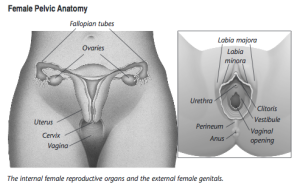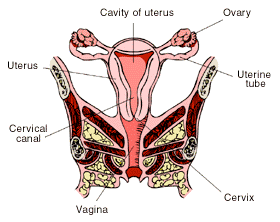Physical pain -female
Why Sex Can Hurt
Painful Sex
Some women find sex unbearably painful. Doubtless, this may affects a couple’s sex life, but dyspareunia or intercourse pain also carries emotional implications. It may be the cause of friction, anxiety and disconnection in the relationship, so seeking treatment is advisable.
What causes painful sex?
Dyspareunia may be caused by a gynecologic problem such as ovarian cysts, which could be physical in nature; or it could be caused by problems with sexual response such as lack of desire or arousal, which could be psychological in nature.
Physical reasons:
1) Vaginismus: over-tightness of the vagina muscles (Figure 1: Vaginal area muscles)
Vaginismus is the physical and physiological condition that prevent women from vaginal penetration, including sexual intercourse, tampon or menstrual cup insertion, or penetration involved in pap tests. This involuntary muscle spasm makes penetration painful or impossible. It is likened to an eye shutting when an object approaches it, as a means of self protection.
Some factors contributing to Vaginismus include:
- urinary tract infections
- vaginal infections (including yeast infections)
- traumatic early childhood experiences (not necessarily sexual in nature)
- sexual abuse, rape or other sexual assault (even attempts)
- domestic violence in the early home environment
- fear of penetration p
- anxiety
- stress
- childbirth trauma
- fear of losing control
- fear of partner’s penis being too large/ or vagina not being wide or deep enough
- body image self-consciousness (ex: thinking the vagina is dirty/
2) Vestibulitis: sore spots around the edge of the opening of the vagina. This occurs when muscle tightness has been existent for quite some time (Figure 2: Areas of hypersensitivity and soreness)
3) Vulvodynia: when severe vestibulitis becomes a daily burning discomfort. A woman may experience this during her period, when she urinates or when her partner’s semen is ejaculated inside her vagina.
4) Vaginitis: inflammation of the vagina. This can be caused by a yeast or bacterial infection. Symptoms include discharge and itching and burning of the vagina and vulva.
5) Skin disorders: Some skin disorders may result in ulcers or cracks in the skin of the vulva. For example: contact dermatitis is a reaction to an irritating substance, such as perfumed soaps, douches, or lubricants. It may cause itching, burning, and pain.
6) Hormonal changes: Decreasing levels of estrogen may cause vaginal dryness during menopause or premenopause. Using a lubricant during sex or a vaginal moisturizer may be helpful.
7) Problems with the Cervix (opening to the uterus), uterus, or ovaries: may include infections, cysts, and fibroids
8) Injury to the vulva/vagina: may include a tear from childbirth or from a cut in the perineum (area between the vagina and anus) that is made during labor.
9) Tissue structure that makes penetration impossible: This is a very rare case. Example: hymen tissue doesn’t stretch.
10) Having sex too soon after surgery or childbirth.
Psychological Reasons
1) State of Mind: Any emotion that make it challenging to relax such as guilt, shame, embarrassment, fear, awkwardness. Arousal is difficult when a woman is not relaxed. Pain may result from this.
2) Stress and fatigue
3) Anxiety in the Relationship: For example: different levels of sexual desire between partners
Treatment
Because painful sex is a physical and psychological condition, there are many ways to treat it.
Some cases do not require medical intervention, so here are self-help suggestions:
- Waiting at least six weeks after childbirth before attempting intercourse
- Using water-based lubricants to deal with vaginal dryness or lack of lubrication
- Avoiding irritants such as bubble baths, soap, heat
- Locally applied creams containing anti-inflammatory drugs
- Applying ice or a frozen gel pack wrapped in a small towel to the vulva to relieve burning after intercourse
- Set aside time for sex when you and your spouse are not tired, stressed or anxious
- Talking to your partner. Letting them know when and where you feel pain as well as which activities you find pleasurable
Prescription medications such as estrogen creams for menopause administered by a health care professional.
Sex therapy or Inner healing could also be an option if there is no underlying medical cause. Some women may need to work through inner issues such as guilt, shame, awkwardness, or in other cases, previous childhood or sexual trauma or abuse.
For vaginismus (tightening of the vaginal muscles), reprogramming these muscles by placing small inserts into the vagina, like a tampon, and leaving them for 10-15 minutes. Over a few weeks, the size of the insert can be increased as the muscles gradually are reprogrammed to not contract automatically.
There are other exercises a woman can also do to reprogram a different memory associated with touch around the vaginal area. The first step would be to touch the vaginal opening as close as possible. Perhaps start at the groin and work towards simply putting a finger on, but not in, the vagina, just to train her muscles to not react or contract. This is a neutral sensation. By practicing in private every day, she can build up to gently inserting her hand into the vagina itself.
Once she is able to do so, it’s most important she see her family physician or gynecologist as they will be able to check the vagina together. During the visit, she may need to feel in control by sitting up on the examining couch, using a mirror and light in order to see the entire process, or even taking the physician’s gloved finger and placing it in her vagina.



